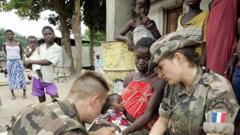Ivory Coast has made headlines with the announcement that French troops will be withdrawing from the nation, indicating a significant reduction of military influence from France in the region. In a statement during his year-end address, President Alassane Ouattara highlighted the move as a step towards modernizing the country’s armed forces. This comes on the heels of Senegal also announcing that French military bases on its territory will be closed by the end of 2025.
Currently, approximately 600 French soldiers are stationed in Ivory Coast, which is the largest remaining troop presence in West Africa, while Senegal hosts around 350 French military personnel. This shift is part of a broader trend, as France has previously withdrawn its forces from Mali, Burkina Faso, and Niger due to increasing anti-French sentiment coupled with military coups in those nations. In a similar vein, Chad ended its cooperative defense pact with France in November, signaling further reduction of its military ties with the former colonial power.
Senegalese President Bassirou Dioumaye Faye, who was elected on a platform of enhancing national sovereignty and independence from foreign influence, directed the armed forces minister to develop a new security cooperation doctrine which would culminate in the cessation of all foreign military presence in Senegal by 2025. Meanwhile, France will continue to maintain a minor presence in Gabon despite these changes.
For more than thirty years post-independence, Ivory Coast (known in French as Côte d'Ivoire) was characterized by relative stability and a vibrant economy, earning recognition for its religious and ethnic harmony. However, the country faced division following an armed rebellion in 2002, leading to a cycle of peace agreements intertwined with violence as it navigated towards resolution. Despite these challenges, Ivory Coast remains the world's largest cocoa exporter, and its citizens enjoy a higher income relative to many surrounding nations.


















